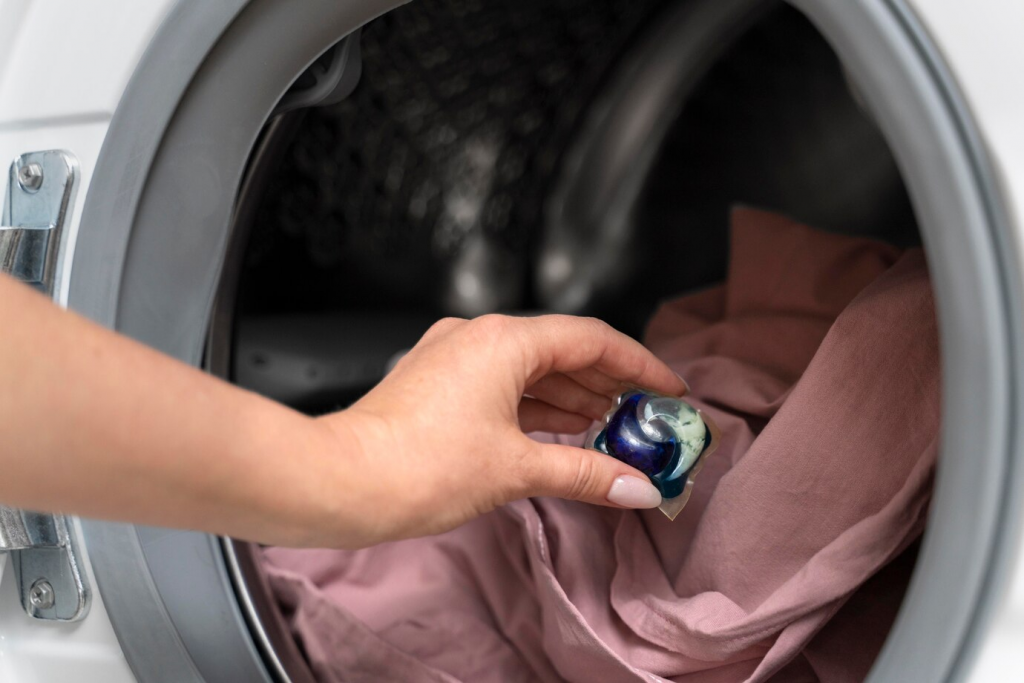After a washing cycle, water that remains within the drum or hidden compartments can lead to smells worse over time. This trapped water might not evaporate entirely, especially in the hard-to-reach areas, and this can be more pronounced after the hottest water cycles since the heat often intensifies odors.
Detergent and Fabric Softener Buildup
Excessive use of detergent does not necessarily translate into cleaner laundry. In fact, too much could cause a residue that hinders proper drainage. This, combined with fabric softener that sticks to the surfaces, might also contribute to that musty smell you’re detecting.
Step-by-Step Guide to Removing Stagnant Water Smells
Cleaning the Washing Machine Drum
Regular cleaning of the drum will help remove odors and prevent them from developing in the first place. Begin with an empty drum and run a cycle using the hottest wash setting. This helps remove detergent buildup and any lingering bacteria.
For a thorough clean, consider the following:
- Baking Soda and Vinegar: Start by sprinkling half a cup of baking soda directly into the drum. Then, pour two cups of white vinegar into the detergent tray. Running your washer on the hottest cycle with this mixture can help to break down residue and odors.
- Commercial Cleaners: There are commercial cleaners formulated for washing machines. These often contain oxygenated bleach, which will not only clean but also sanitize the drum. Always follow the instructions on the product for the best results.

Addressing the Gasket, Detergent Drawer, and Filters
The rubber gasket around the door, where water and moisture can collect, needs regular attention to prevent odors. Take a cloth and a mild detergent or vinegar solution and wipe thoroughly, paying close attention to the folds where water pools.
The detergent drawer and filters are often overlooked but play a significant role in maintaining a clean, odor-free machine. Remove the detergent drawer and soak it in hot water mixed with a bit of detergent to break up any old soap and softener. Gently scrub with a brush or sponge, rinse well, and dry before replacing.
| Part to Clean | Cleaning Agent |
|---|---|
| Washer drum | Baking soda and vinegar/hottest wash |
| Gasket and Drawer | Mild detergent or vinegar solution |
| Filters | Hot water |
Preventative Measures for a Fresh-Smelling Washer
Prevention is just as important as the cure. To avoid that musty smell returning to your laundry companion, there are a few habits you could also adopt:
- Leave the door ajar: Post-washing cycles, keeping the door open will help any residual moisture evaporate, thereby reducing the chance of smells coming back.
- Use the correct amount of detergent: Using more detergent than needed will not make your clothes cleaner and might cause buildup in your machine which, in turn, harbors smells.
- Regular maintenance washes: Running an empty wash with a cleaning agent on the hottest water setting helps keep the drum and its components clean.

Troubleshooting Persistent Smells
Even after following the above-mentioned steps, some washing machines might continue to harbor a persistent odor. This could be a sign of deeper issues that require a bit more digging and elbow grease to resolve.
When to Call a Professional
Sometimes, despite our best efforts, a DIY clean just isn’t enough. If you’ve tried multiple cleans and the smell persists, it might also be time to call a professional. Experts may discover problems like internal blockages or worn-out components that could cause the odor. A professional can dismantle parts that the average homeowner might not be able to access and ensure everything is cleaned properly. Moreover, if there’s any repair work to be done, they will be well-equipped to handle it.
DIY Fixes for Persistent Problems
If you’re a keen DIY’er, there are a few additional steps you could take before resorting to professional help:
- Inspect and clean the hoses: Detach the hoses from the back of the washing machine and inspect them for clogs or stagnant water. Rinse them out thoroughly with the hottest water and a mixture of baking soda and vinegar.
- Check and clean the pump filter: Sometimes debris in the pump filter could cause the smell. Refer to the user manual on how to access and clean your machine’s pump filter.
- Deep clean with enzymatic cleaners: Enzymatic cleaners can break down organic matter that might be contributing to odors. They’re particularly effective against the smells coming from organic residue like oils and grease.
Ensuring Long-Term Freshness in Your Washing Machine
Regular Maintenance and Good Habits
A routine maintenance schedule for your washing machine is a must if you want to keep it smelling fresh. Here are some key steps:
- Wipe down the drum, gasket, and door after use: Removing moisture promptly helps prevent the growth of mold and mildew.
- Perform a cleaning cycle monthly with a washing machine cleaner: This cycle can be done using either commercial cleaners or natural solutions like vinegar and baking soda.
- Remove wet clothes promptly: Don’t let damp clothes sit in the machine for long periods, as this contributes to stale odors.

Conclusion
Stagnant water smells in washing machines are a common issue that can tarnish the cleanliness of your laundry space and clothes. Yet, with the appropriate know-how and routine care, these musty smells can be effectively removed and prevented. Tackling the drum, gasket, detergent drawer, and filters with a mix of natural products and commercial cleaners, and adopting some preventative habits, will help you maintain a fresh-smelling washing machine. For tougher challenges, do not hesitate to consult a professional. Remember, the freshness of your clothes and the efficiency of your washing machine are direct results of the care you invest in them.
FAQs
- What causes the smell in my washing machine?
- Can I use bleach instead of vinegar to clean my washing machine?
- How often should I clean my washing machine to prevent odors?
- Why do my clothes still smell musty even after washing?
- What should I do if cleaning doesn’t get rid of the washing machine odor?
